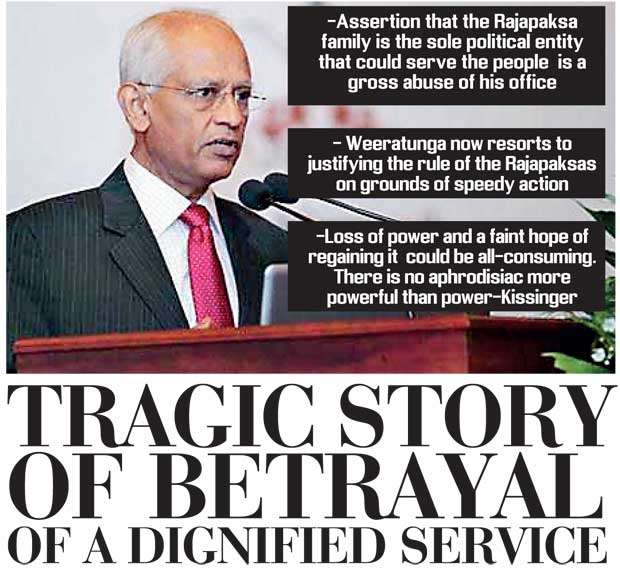Tragic story of betrayal of a dignified service

“It is not power that corrupts but fear. Fear of losing power corrupts those who wield it and fear of the scourge of power corrupts those who are subject to it.” ~Aung San Suu Kyi
2018-08-01

 eylon Civil Service, later transformed into Sri Lanka Administrative Service, has been a dignified public service.‘It functioned as part of the executive administration of the country in various degrees until Ceylon gained self-rule in 1948. Until it was abolished on 1 May 1963 it functioned as the permanent bureaucracy or secretariat of Crown employees that supported the Government of Ceylon’ (Source: Wikipedia).
eylon Civil Service, later transformed into Sri Lanka Administrative Service, has been a dignified public service.‘It functioned as part of the executive administration of the country in various degrees until Ceylon gained self-rule in 1948. Until it was abolished on 1 May 1963 it functioned as the permanent bureaucracy or secretariat of Crown employees that supported the Government of Ceylon’ (Source: Wikipedia).Among the great men who peopled this strikingly distinct public service were Sir Ponnambalam Arunachalam (The first Ceylonese Civil Servant), Shirley Amarasinghe, Raju Coomaraswamy, Sir Richard Aluvihare, M J Perera, G V P Samarasinghe, Bradman Weerakoon, M D D Peiris and Mahi Wickremaratne.
"Yet, Lalith Weeratunga’s assertions that the Rajapaksa Family is the sole political entity that could serve the needs of the people of Sri Lanka are a gross abuse of his office as a senior member of Sri Lanka Administrative Service (SLAS)."
Outside the Civil Service per se, there were some outstanding public servants, who contributed immensely to the enrichment of the public life of the nation. Amongst them were Dr Wickrema Weerasooria, Lal Jayawardene and Warnasena Rasaputra.
All these gentlemen were not devoid of politics. They certainly would have had their personal political thinking and even might have had their personal biases right throughout their careers.
Yet, they did not go before the television cameras and openly canvass public opinion on behalf of their masters.
That is the legacy, in addition to their splendid work as public servants, which they left behind- a total apolitical demeanour before the public.
How does a political bearing of a public servant, especially during the time of an election, matter and how does that particular behaviour colour the public service as a whole?
All these gentlemen were not devoid of politics. They certainly would have had their personal political thinking and even might have had their personal biases right throughout their careers.
Yet, they did not go before the television cameras and openly canvass public opinion on behalf of their masters.
That is the legacy, in addition to their splendid work as public servants, which they left behind- a total apolitical demeanour before the public.
How does a political bearing of a public servant, especially during the time of an election, matter and how does that particular behaviour colour the public service as a whole?
 That is the question each public servant in the country is faced with today and what Lalith Weeratunga, Mahinda Rajapaksa’s Secretary during the eight years of their power, did during those vile years and what he is portraying himself to be is laughable.
That is the question each public servant in the country is faced with today and what Lalith Weeratunga, Mahinda Rajapaksa’s Secretary during the eight years of their power, did during those vile years and what he is portraying himself to be is laughable.Today Lalith Weeratunga is an alleged offender.
The allegation that he was one of the key people in the alleged abuse of State money for the purchase of the infamous Sil Redi in order to sway the voters of Sinhalese Buddhist ilk is a formidable one.
How he would be plotting to extricate himself in courts of law is another matter altogether.
Yet, Lalith Weeratunga’s assertions that the Rajapaksa Family is the sole political entity that could serve the needs of the people of Sri Lanka are a gross abuse of his office as a senior member Sri Lanka Administrative Service (SLAS).
After being a direct beneficiary of the Rajapaksa rule and presiding over a public service that was subjected to total apathy and subservience to one single family rule, Weeratunga now resorts to justifying the rule of the Rajapaksas on grounds of speedy action and decision-making processes that were present during that time.
After being the most dominant public servant during the Rajapaksa regime, the inevitable message sent down the well-structured layers of the SLAS is one of ‘It’s okay to look the other way when politicians resort to looting the Government coffers’.
The grave damage caused to the once-dignified SLAS is incredible. What is even more injurious is what he has chosen to do after his retirement from serving the Rajapaksa family instead of the country.
Whatever Weeratunga’s defence his lawyers are contemplating, his association with Mahinda Rajapaksa from the outset of the Helping Hambantota fiasco (From which Mahinda Rajapaksa was acquitted by the then Chief Justice Sarath N Silva, whose political allegiances continue to change as the country’s un-forecastable weather), has been solid and unbreakable. Nevertheless, Sarath N. Silva later apologized to the people of Sri Lanka for rendering a ‘wrong’ decision in the Helping Hambantota case.
"The allegation that he was one of the key people in the alleged abuse of State money for the purchase of the infamous of Sil Redi in order to sway the voters of Sinhalese Buddhist ilk is a formidable one."
Rajapaksas have a very obscure and indefinable relationship with facts.
Having been comforted by the luxuries of absolute power from 2005 to 2014, they are still living in that exalted cocoon from which they seem utterly uncomfortable to come out.
This happens to all dictatorial leaders.
Chanakya, the sage of the ancient world said that ‘the ultimate goal of all rulers should be to make their subjects free of fear’. The Rajapaksas have done the exact opposite.
Having installed his own brother in the Ministry of Defence as its administrative and financial head, Mahinda Rajapaksa unleashed some of the worst and atrocious forces against the people who chose to defy them.
Having been comforted by the luxuries of absolute power from 2005 to 2014, they are still living in that exalted cocoon from which they seem utterly uncomfortable to come out.
This happens to all dictatorial leaders.
Chanakya, the sage of the ancient world said that ‘the ultimate goal of all rulers should be to make their subjects free of fear’. The Rajapaksas have done the exact opposite.
Having installed his own brother in the Ministry of Defence as its administrative and financial head, Mahinda Rajapaksa unleashed some of the worst and atrocious forces against the people who chose to defy them.
Lalith Weeratunga was indeed an integral part of that wheel of fear and terror. A complete public servant like M D D Peiris who was one time Secretary to Prime Minister Sirimavo Bandaranaike would have shuddered and handed his resignation if he were asked to look the other way.
Speaking of a public service of the past is utterly useless unless one needs to see where some constructive changes could be introduced and implemented. That public service is gone and is a derelict of the dead past.
The current crop of public servants who are dominating the upper echelons of SLAS might not be unrelenting in carrying out the government policies, but their commitment and allegiance to facts, accountability and transparency seem to have fallen by the wayside.
If there were one person who could be singularly responsible for such a sharp fall in the public service in Sri Lanka, it was Lalith Weeratunga.
His close relationship with Mahinda Rajapaksa made his visibility to the public even more distinct.
Lalith Weeratunga appeared on television and other radio talk shows during the last Presidential Election campaign.
"After being the most dominant public servant during the Rajapaksa regime ..Weeratunga’s demeanour reveals a picture that ‘it’s okay to look the other way when politicians resort to looting the Government coffers’."
They are indeed inexcusable. No public servant has done before and no public servant has done since.
Secretary to the President is an apolitical job. He may have his own personal political allegiances and likes. Yet, those who are chosen to that service, Sri Lanka Administrative Service, are deemed to have ridden themselves of that political garb when they execute government policies.
It is one thing to implement policies and programmes dictated by the Cabinet of Ministers who are politicians but to openly exhibit undiluted bias and prejudices towards a political vision is no embellishment to his professional career.
The writer has chosen a quotation from Aung San Suu Kyi, the charismatic new leader of Myanmar.
She couldn’t have been more correct. The loss of power for Mahinda Rajapaksa was deeply felt by his immediate family and close cohorts. Lalith Weeratunga belongs to the latter category- close cohorts.
That loss of power and a faint hope of regaining that power could be all-consuming. There is no aphrodisiac more powerful than power, so said Henry Kissinger. That love of power has turned into a lust; that lust is driving them into a corner, not of reflection on their mistakes and erroneous decisions; it has turned their attention to a more immediate need- how to regain that power.
In that pursuit of lust, they are trying to legitimize and validate their wrongful decisions not in the way a scientist trying to rectify an entry of wrong facts into a scientific formula but as a hungry predator pursuing a helpless and unarmed prey running for its life. That is the tragic story of a dignified service to which Lalith Weeratunga belongs.
